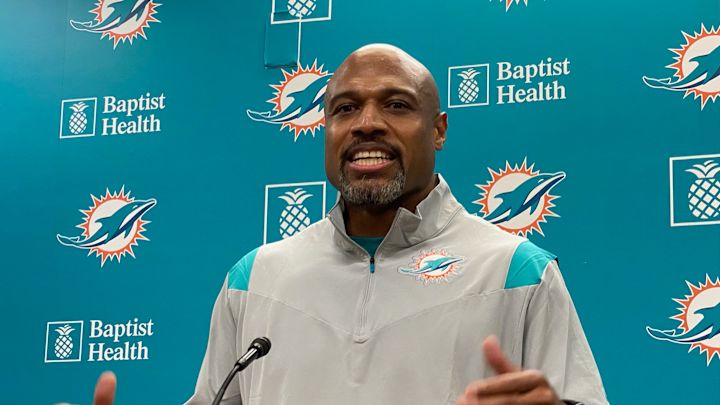Kelly: Weaver's Experience As a Player Should Help with Changing Tide

There’s a new wave of professional athletes spawned by the Name, Image and Likeness (NIL), and the transfer portal era of collegiate sports.
The age of the pampering in sports has grown up to become the era of the entitled pro.
This is what happens when we’ve spent decades handing out participation trophies.
We’re unfortunately in a day and age where everyone who isn’t catered to, coddled, comforted is looking to move on, or shops their talents to another suitor.
This evolution of humanity, which has been occurring for over the past two decades in most levels of the major sports, is seemingly pushing out the old-school NFL coaches, putting an expiration date on the yellers and screamers, forcing the “do it my way and don't ask any questions” coaches into early retirement.
That was one of the Miami Dolphins players' biggest gripes about former defensive coordinator Vic Fangio, who had a stubborn approach to how he ran his defense.
Change of approach was needed
Players found Fangio’s uncompromising nature to be a turnoff and lobbied head coach Mike McDaniel for change, even before Fangio and the Dolphins mutually parted ways, and he ended up joining the Philadelphia Eagles in the same capacity.
According to McDaniel, the process for replacing Fangio was about finding the right fit. He was clearly seeking someone who fit his “player first” mentality.
“[Someone] who could have the biggest impact as a person,” McDaniel said upon introducing Weaver last week as his third defensive coordinator in three seasons.
To Weaver’s credit, he checks just about every box a player might want from their next defensive coordinator, and atop that list is the fact he’s been in these same foxholes as the players afterhaving spent seven seasons in the NFL, starting 98 of the 103 regular season games he played.
“I think that’s been a huge asset for me just in general throughout my coaching career. Not necessarily for the ups of what I did while I played, but more of the hardships and adversity that I faced,” Weaver said last week. “I can help coach guys through that [(adversity) so they can persevere and ultimately, hopefully, be better than I was in those same situations. That is probably the biggest asset for me as far as my playing career. Just having the ability to coach guys through those adverse situations.”
That means understanding a player’s on-field, in-game perspective has value, and might point the coaching staff in the right direction when it comes to game strategy and challenging matchups.
Collaboration is sought from players
That level of respect and collaboration wasn’t happening under Fangio, and the disconnect seemingly didn’t jell well with the type of organization McDaniel was trying to build.
However, there’s a fine line between collaboration and catering, and it’s going to be on Weaver and the remodeled defensive staff to make sure they walk it without experiencing many stumbling blocks.
A recipe for disaster is trying to appease everyone, but this generation of players don’t want to be ignored or feel devalued.
“You may not see me if I made that NIL money back then,” Weaver joked, referring to the compensation top performing college players are receiving for their contributions on the field. “But I think overall, the players are the same. You hear guys saying, ‘This decade of players, they’re soft,’ and all this stuff with social media. The players are the same. They want to be coached hard and they want to be loved up, and that’s what I believe in.
“I believe in, coach them hard and love them up,” Weaver added. “Usually when you do that, they tend to respond for you.”
That’s identical to McDaniel’s player-friendly approach.
History with McDaniel beneficial
Weaver actually began his relationship with McDaniel in Houston when he was a player and the Dolphins head coach was a quality control offensive assistant for the Texans in 2006.
Later, they coached together on the staff of the Cleveland Browns, and through the years, Weaver said, he maintained a high level of respect for McDaniel.
“I was like, ‘Oh, he’s special,’ ” Weaver said. “It took the rest of the world a little longer to see that.”
Now the question is whether McDaniel and Weaver can build something special together in Miami, where the defense needs to be retooled and will hopefully be built with the toughness and physicality that’s been a calling card of the Baltimore Ravens, the franchise Weaver has spent the past three seasons coaching.
“I think the one thing about that place is, and it probably started a long time ago with Ray Lewis and that squad. Every single person who has stepped in that building since tries to live up to that standard,” Weaver said about the Ravens, for whom he spent four seasons playing. “So that probably has a lot to do with it, from a scouting standpoint. Ultimately I think it’s the same thing here, you want to make sure you get guys with high football character. I believe for the most part we have that here. When you watch the film, these guys play hard.”
The process should go a lot smoother knowing that they’ll be playing for someone who has walked in their cleats.
